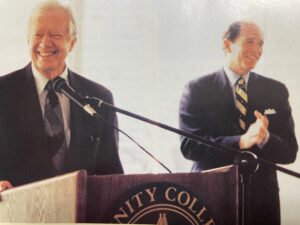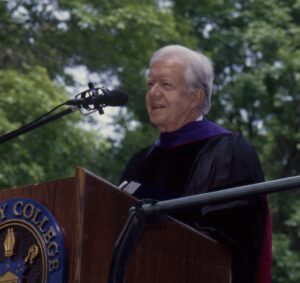President Carter to Class of 1998: Three Things I Want You to Remember
Editor’s Note: This story was initially published in early 2023.

By his own telling, former President Jimmy Carter received input for his Trinity College commencement speech from two sources.
In the months before the May 1998 ceremony, the nation’s 39th president had held a meeting with the leaders of East African nations. There, he passed around a hand-held tape recorder and asked each to share what American universities meant to them and their countries.
During a separate trip to South Africa to see President Nelson Mandela, Carter visited his grandson on his Peace Corps assignment. Having recently experienced his own college graduation, Jason willingly offered his grandfather advice on the speech.
“He said, ‘Papa, it’s very unlikely that they will remember anything you say, so just be brief.’ Well, I’ve taken that on as a challenge,” Carter announced to the audience of 448 bachelor’s and 28 master’s degree candidates seated on the Main Quad.
As the nation mourns the death of Carter, 100, on December 29, there are so many recollections of the president who hailed from a peanut-growing family in Plains, Georgia, traveled the world, and returned home.
At Trinity, the memories include the advice Carter shared on one humid and overcast day.
“What sears that day into my mind was when President Carter started the speech, literally the clouds parted and the sun came out,” says Carlos Espinosa ’96, M’98, director of the Trinity College Office of Community Relations and Trinfo.Café, who received his master’s degree that day. “I distinctly remember sitting in a row where the sun broke through the tree canopy and was beating down on me in my black robe.”
The Oval Office
Carter’s presidential victory was far from assured when a 10-year-old Kevin McMahon, now the John R. Reitemeyer Professor of Political Science at Trinity, went to bed on election night in 1976.
Carter’s single term in the White House was defined by decisions that have been criticized, said McMahon.
His administration established the U.S. Department of Energy and created a national energy policy that included conservation, price control, and new technology, for example. But the energy crisis that preceded those efforts, when an Arab oil embargo caused fuel shortages, a quadrupling of oil prices and long lines at gas stations, strained the nation.
McMahon recalled watching the president’s televised interviews from the White House in which he wore a sweater because, he announced, they had turned down the heat to conserve energy.
Yet in a post-presidency that spanned four decades, Carter devoted himself to humanitarian endeavors that received international recognition. He championed efforts that ranged from protecting emerging democracies around the world to developing housing for families in need at home through the Georgia-based Habitat for Humanity.
“He really redefined post-presidency years,” said McMahon. “In many ways, he’ll be remembered more for the work after the White House than in the White House. He’ll be remembered most for how he committed to trying to make the world a better place… to accomplish things at a very small scale—like teaching Sunday School—and at a global scale with the Carter Center.”
The World Stage

Almost two decades after he left the White House, Carter arrived at Trinity to deliver the commencement speech during the college’s 175th year, and receive an honorary doctorate of humane letters.
He had already established the Carter Center to promote and expand human rights, which would one day earn him a Nobel Peace Prize. And, by that time, he had visited 125 nations.
A prolific writer, Carter noted that he had a baker’s dozen books to his name—one of those co-authored with his wife, Rosalynn.
Addressing the Trinity community, Carter vowed he would adhere to his grandson’s advice to be brief. He said, “I’m going to be brief, but I also want you to try to remember three things that I say.”
In a speech rich with anecdotes, Carter set about deliver those. First, he defined wealth and poverty, and noted that the “greatest discrimination” throughout the world was economic poverty.
While Carter did not reference his own struggles, for a year early in his marriage he, Rosalynn, and their three sons lived in public housing. On that day in 1998, Carter told the graduates, “We should always be the champion of human rights. We should espouse environmental quality and demonstrate that our belief is genuine. And we should be willing to share our wealth with others.”
To his second point, Carter noted, the students should embrace being world citizens. “We’re inclined to live in an encapsulated world of our own creation. We like to be with people who are just like us. The same color. The same kind of clothes. The same kind of automobile. The same kind of houses. Go to the same place to worship. But there’s a vast world out there. Not just in our own country but in other nations, as well,” he said.
Thirdly, Carter espoused the ability to dream. “I received an award today from Trinity, one of the few colleges, as you know, that has engineering and also liberal arts combined. I’m very proud of that and it reminded me of a story that illustrates the third point I want to make. And that is, we should never, ever limit what we can imagine or dream or conceive.”
For Class of 1998 valedictorian Shahryar Khan, who is Pakistani, Carter’s speech resonated because of his remarks on international relations. When the former president referenced nuclear proliferation and “India’s explosion of five nuclear devices,” it brought attention to a critical current issue.
“It was timely and spot-on,” said Khan, who was interviewed by local television station on that topic afterward, in a clip that his parents recorded.
Khan, now an executive director at J.P. Morgan, shook hands with the former president at a luncheon following commencement. While technology at the time had not advanced enough to enable any selfies with Carter, Khan has his memories. “Any time anyone asks about graduation, I don’t shy from pointing out that I met him,” Khan said.
One More Thing
While Carter noted he would offer just three pieces of advice to graduating seniors, it appears from the oration that he did not honor his own pledge.
Instead, Carter added a fourth thing and referenced wisdom from Saint Paul from the Bible:
“Graduating from college is a turning point. It’s a time of unprecedented freedom to make choices about life… And this may be the fourth thing you want to remember—‘the things you cannot see’ are the most important.
“What are the things you can’t see? You can see a bank account. Is that important? You can see a beautiful house. You can see your name in the paper. But you can’t see justice. You can’t see peace. You can’t see service and humility and compassion. Those are the important things. And there was one more thing that Paul mentioned, and that is love.”

